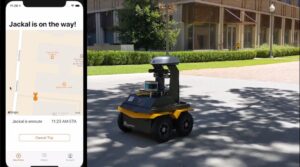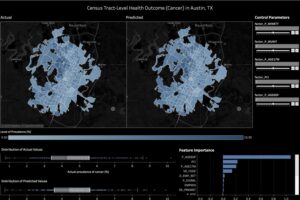It is very easy to fall into the trap of putting sensors around town to collect data, without developing a data strategy. It is important to think through what data is being collected, how it will be stored, and what problems it will help us solve. “Smart solutions” should be… read more
Optimizing Ambulance Allocation and Routing During Extreme Events
Optimizing ambulance allocation and routing is one of the most efficient ways for the EMS to save more lives at virtually no cost. However, current EMS software were developed under models that assume normal demands. They are unable to adapt to disasters such as the COVID-19 pandemic, where traffic patterns… read more
Towards Fully Intelligent Transportation through Collaborative Autonomous Driving: Real-World Deployment Experiences
The collaborative autonomous driving approach depends on the collaboration between intelligent roads and intelligent vehicles. This approach is not only safer but also more economical compared to the traditional on-vehicle-only autonomous driving approach. In this talk, we introduce our real-world deployment experiences of collaborative autonomous driving, and delve into the… read more
Winter Weather Roadway Operations
This project sponsored by the Texas Department of Transportation looks at ways to harness new technologies in sensors and data providers to improve winter weather roadway operations. Project efforts look at winter weather around the north-central Texas city of Abilene, the 27th most populous city in the state. Sensors and… read more
Last Mile Autonomous Delivery Systems
Researchers from four UT labs have been building a system that will use robots to conduct contactless deliveries on campus — carrying everything from food to books. People will be able to place orders via a new iOS app, starting with lemonade. The robots will cross complex terrain and navigate… read more
City of Austin Open Data Meetup – AI Housing Analysis Presentation
The Austin AI Housing Analysis is a new research collaboration between the University of Texas and the City of Austin funded by UT’s Good Systems Grand Challenge. The project will use deep learning technology and an open GIS data repository to evaluate historical housing development and help policymakers shape equitable,… read more
Improving Pedestrian Safety through Traffic Video Analytics: A use case of combining AI, HPC for smart city
Pedestrian safety on the road is a priority for transportation system managers and operators. However, identifying location with high risk is a challenging task. Current practice often requires manual observation of candidate locations for limited time periods, leading to an identification process that is often time consuming, lags behind traffic… read more
Urban Health Risk Mapping – Measuring the impact of neighborhood environments on personal health
This project developed an AI system that can measure the health effects of neighborhood environments in ten major US cities using citizen crowd-sourced data. The research team mapped the computed health risk scores at the census tract-level for all selected municipalities and also built an interactive website that allows users… read more







